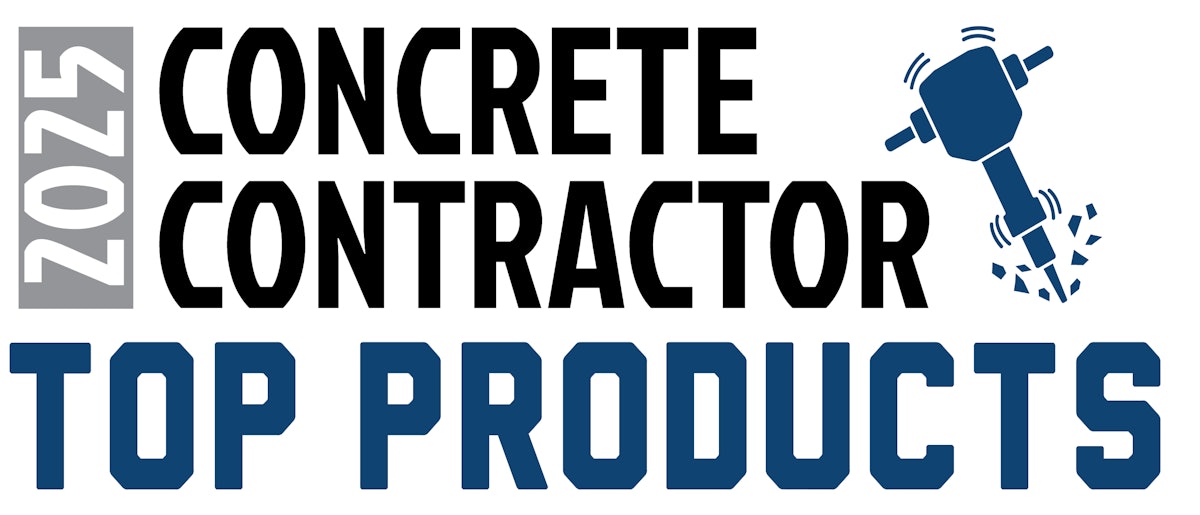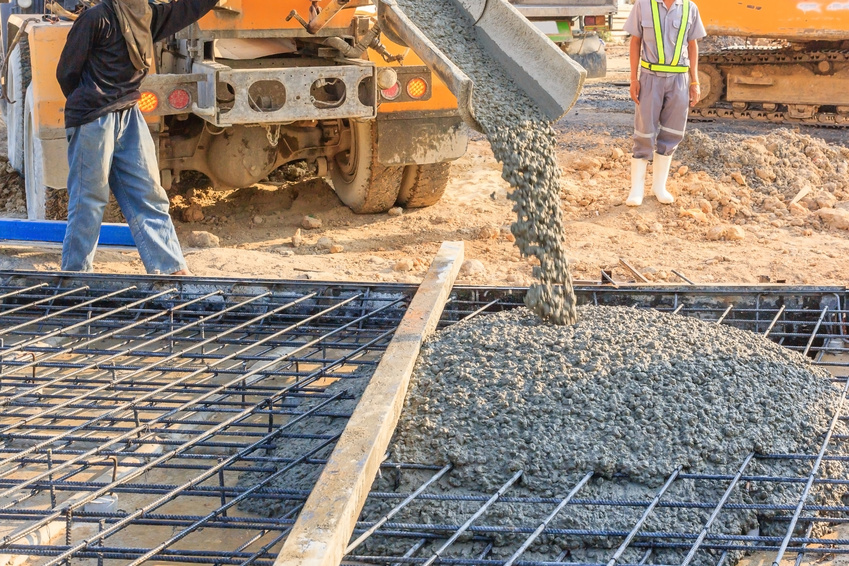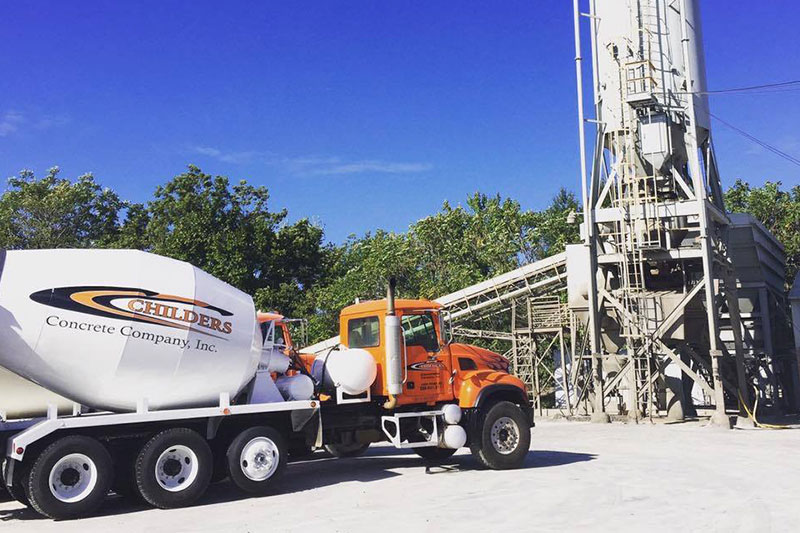The Advantages of Making Use Of Concrete Providers for Resilient Structures
Concrete solutions use a variety of benefits for creating long lasting structures. This material is renowned for its exceptional stamina and longevity. Its resistance to ecological elements makes it a sensible option for numerous climates. Additionally, concrete is typically more affordable in the future. As home builders and designers progressively discover innovative applications, the capacity of concrete in layout ends up being much more interesting. The conversation of these benefits discloses compelling insights right into modern-day construction methods.

Exceptional Stamina and Durability
Concrete is renowned for its phenomenal strength and toughness, making it a favored product in construction. Concrete Contractors Near Me. Its capacity to resist and endure heavy loads deformation under pressure is unequaled, which is why it is often utilized for fundamental elements, supporting structures, and skyscrapers. The make-up of concrete, which consists of cement, water, and aggregates, allows it to accomplish high compressive stamina, commonly exceeding that of traditional building materials like timber or steel. This toughness assures structural integrity and longevity, thus minimizing maintenance prices in time. In addition, concrete's sturdiness is apparent in its capability to withstand different stress and anxieties without yielding to wear and tear, making it suitable for varied applications, from bridges to property homes. In general, the robust attributes of concrete add to its track record as a trustworthy choice for creating long-lasting frameworks that stand the examination of time
Resistance to Environmental Elements
Many construction materials are prone to ecological degeneration, concrete displays exceptional resistance to various aspects such as wetness, temperature variations, and chemical exposure. Its inherent buildings make it especially ideal for diverse applications, from property structures to big facilities tasks. Concrete's reduced permeability limits water absorption, reducing the risk of damage from freeze-thaw cycles and preventing mold growth. Furthermore, it preserves architectural honesty when exposed to extreme temperature levels, making it ideal for regions with extreme environments. Concrete also stands resistant against chemical attacks, consisting of sulfates and acids, which can weaken other materials. This resistance is additionally boosted by the use specialized ingredients and treatments during the mixing process. In general, concrete's longevity despite ecological challenges guarantees longevity and dependability, making it a favored option for engineers and home builders intending to build enduring structures.
Cost-Effectiveness Gradually
Cost-effectiveness in concrete solutions materializes as a long-term investment that considerably benefits frameworks. This strategy not just minimizes maintenance costs however also enhances power effectiveness, causing considerable savings over time. Understanding these elements is necessary for assessing the total worth of resilient concrete building and constructions.
Long-Term Financial Investment Perks
Purchasing long lasting structures returns considerable lasting advantages that prolong past first expenditures. Concrete solutions, recognized for their toughness, add to a structure's durability, ultimately decreasing the overall expense of ownership. By utilizing top quality materials and skilled craftsmanship, proprietors can expect less repair work and substitutes gradually. This dependability equates right into a secure possession value, making concrete buildings a sensible financial selection in the genuine estate market. Additionally, structures built with concrete are usually extra energy-efficient, additional enhancing their cost-effectiveness. Therefore, the first investment in concrete solutions can cause considerable savings and higher returns over the years, attesting the worth of picking durable choices for durable building jobs.
Reduced Upkeep Expenses
The durability of concrete structures not only boosts possession worth however additionally considerably reduces maintenance expenses in time. Unlike materials that weaken rapidly, concrete shows exceptional durability versus various environmental aspects, such as moisture, temperature level fluctuations, and insects. This integral sturdiness equates to fewer substitutes and fixings, thereby minimizing long-term expenses. In addition, the reduced absorption rate of concrete limitations concerns associated with mold and mildew, which can require costly remediation initiatives. Normal upkeep is typically minimized to straightforward cleansing instead than substantial repairs, better adding to cost-effectiveness. Consequently, residential property owners purchasing concrete services can expect a considerable reduction in upkeep budgets, making concrete an economically sound choice for durable structures.
Power Performance Financial Savings
As energy effectiveness becomes progressively important in construction, concrete frameworks stand out for their capacity to improve long-term financial savings on utility expenses. The thermal mass of concrete allows structures to maintain secure indoor temperature levels, decreasing the need for home heating and cooling systems. This building decreases power intake and translates to lower power expenses over time. In addition, concrete's sturdiness adds to fewer repair services and replacements, likewise boosting cost-effectiveness. In addition, contemporary concrete technologies, such as shielded concrete types and energy-efficient mixes, improve insulation and energy performance, resulting in considerable financial savings. Spending in concrete solutions not only benefits the atmosphere with minimized power use however likewise uses substantial monetary advantages for building proprietors in the long run.
Adaptability in Style and Application
Concrete's flexibility in design and application allows for a large range of adjustable aesthetic alternatives, making it appropriate for various building styles (Concrete Contractors Near Me). Its capability to adapt to varied structural applications improves its performance in both residential and industrial projects. This adaptability placements concrete as a recommended product in contemporary building
Personalized Visual Alternatives

Varied Structural Applications
Checking out the varied architectural applications of concrete reveals its impressive adaptability in layout and performance. Concrete is made use of in various kinds, consisting of foundations, walls, pavements, and attractive components, permitting it to adjust to numerous building designs. Its integral strength great site and sturdiness make it appropriate for skyscrapers, bridges, and infrastructure jobs. Concrete can be formed into elaborate shapes, accommodating cutting-edge layouts while keeping structural integrity. This adaptability also encompasses household applications, such as patio areas, driveways, and preserving wall surfaces. In addition, innovations in modern technology have actually caused the advancement of specialized concrete combinations, enhancing performance in specific environments. This wide-ranging applicability highlights concrete's crucial role in contemporary building and construction, meeting both aesthetic and practical demands successfully.
Low Upkeep Demands
Numerous building owners appreciate the reduced maintenance demands connected with concrete frameworks. Unlike products such as wood or steel, concrete is normally immune to insects, rot, and deterioration. This longevity substantially decreases the frequency and price of repair services with time. Fractures and surface area wear can be quickly addressed with very little effort, commonly requiring just periodic sealing or resurfacing.Additionally, concrete structures do not need regular paint or discoloration, further adding to their reduced maintenance. This characteristic is specifically advantageous for business properties, where upkeep prices can promptly accumulate.Furthermore, concrete is much less prone to weather-related damage, making sure that frameworks stay intact regardless of ecological conditions. As a result, residential property owners can delight in the long-term advantages of concrete, including reduced labor and maintenance expenses, allowing them to designate resources to various other crucial areas of their residential properties. Ultimately, the low upkeep demands of concrete make it an eye-catching choice for building sturdy frameworks.
Eco-Friendly Building Material
As the need for lasting building practices expands, concrete arises as an environmentally friendly building product that offers many ecological advantages. Its production can include recycled materials, such as industrial spin-offs and waste accumulations, which reduces the need for virgin resources and lessens garbage dump waste. In addition, concrete has the capacity to control temperature level, consequently enhancing power efficiency in structures. This thermal mass impact can cause reduced energy usage for heating & cooling, more reducing a framework's carbon footprint.Moreover, concrete is resilient and long lasting, which indicates frameworks require less repair services and improvements gradually, causing much less resource usage overall. Developments in modern technology have actually additionally resulted in the growth of green and low-carbon concrete solutions that decrease greenhouse gas exhausts during production. By focusing on concrete in building and construction tasks, builders can add to an extra lasting future while guaranteeing the longevity and strength of structures.
Boosted Property Worth and Appeal
A well-constructed concrete framework notably enhances residential or commercial property value and allure, typically making it more eye-catching to prospective customers or occupants. Concrete's longevity and low upkeep requirements add greatly to long-lasting investment returns. Characteristics including premium concrete constructions tend to draw in greater offers due to their perceived stability and longevity. On top of that, cosmetically pleasing concrete designs, such as stamped or colored coatings, can boost curb appeal, producing a positive very first impression.Moreover, concrete structures frequently meet modern-day building requirements, which can be a marketing point for ecologically aware consumers. The energy effectiveness related to well-insulated concrete additionally interest customers looking to decrease energy prices. Generally, buying concrete services not just boosts the architectural integrity of a home but also improves its bankability, causing boosted residential property value and an affordable edge in the property market.
Often Asked Questions
For how long Does It Take to Heal Concrete Correctly?
The treating process of concrete commonly takes about 28 days to attain perfect toughness, although preliminary setting takes place within hours. Elements like temperature level and humidity can influence the treating straight from the source period and effectiveness significantly.
What Sorts Of Concrete Provider Are Offered?
Various kinds of concrete services exist, including putting, forming, ending up, resurfacing, and ornamental concrete. Concrete Companies Near Me. Business may also use repair work, remediation, and setup of concrete frameworks, satisfying both household and business needs
Can Concrete Be Recycled After Its Use?
Concrete can without a doubt be reused after its usage. When processed, it can be repurposed for new construction jobs, reducing waste and promoting sustainability within the building market while maintaining structural honesty in new applications.
What Are the Finest Practices for Pouring Concrete?
When pouring concrete, best methods include correct site preparation, making sure excellent temperature level conditions, using proper blending ratios, maintaining constant pouring techniques, and allowing adequate curing time to enhance strength and resilience of the finished framework.
Exist Any Alternatives to Typical Concrete?
